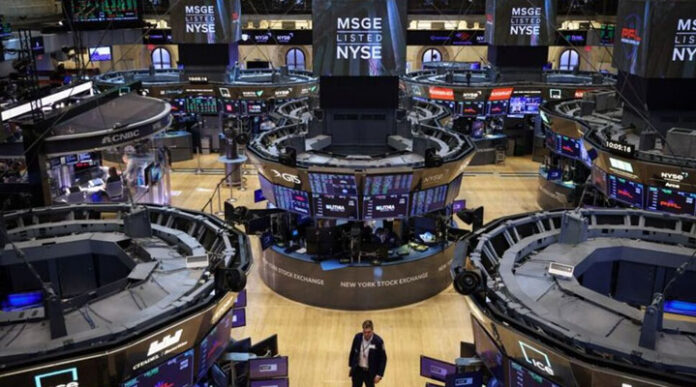Mike Dolan provides his outlook for the day ahead in the U.S and global markets.
Meteorological autumn has arrived, the Labor Day holiday is approaching, and global markets are in a bad mood.
With the exception of Japan, short-term bond yields across the G7 continue to rise on a toxic mix of sky-high inflation, increasingly hawkish interest rate expectations, and the prospect of central banks gradually withdrawing as bond bidders as they attempt to unwind their bloated balance sheets.
Despite Thursday’s surprisingly soft ADP private sector jobs report for August, the sell-off in US Treasuries shows no signs of abating, with markets strongly expecting another 75 basis point rate hike from the Federal Reserve this month. Markets now expect the European Central Bank to raise interest rates by the same amount next week.
Overnight, two-year US yields hit a new 15-year high of 3.52%, and 10-year yields rose above 3.2% for the first time since June – and eurozone and UK bond yields also rose. With stocks falling around the world, the S&P500 futures were in the red ahead of Thursday’s open.
The dollar remains overvalued across the board, but Japan’s yen and the British pound were targeted on Thursday.
With the Bank of Japan determined not to follow its G7 peers in tightening monetary policy and yawning bond yield gaps, the yen fell to a 24-year low of just under 140 per dollar, prompting government officials to issue warnings about excessive currency market volatility.
The pound fell to its lowest level against the dollar since the pandemic struck, following its worst month since the Brexit referendum in 2016. The Bank of England may lag peers in tightening to plough a middle ground, even as it actively sells government bonds from its portfolio, as a winter energy price crunch exacerbates both inflation expectations and deep recession fears.
On the energy front, there was some relief on Thursday as crude oil prices fell further and German power prices continued their sharp decline from early week highs.
When the G7 finance ministers meet on Friday, they will discuss the US proposal for a price cap on Russian oil, according to the White House.
As part of its upcoming proposals to address soaring energy costs, the European Commission is also looking into options to cap energy prices and reduce electricity demand.
The news that the US government has told Nvidia (NVDA.O) to stop exporting certain chips to China has put chipmakers back in the spotlight.
Geopolitical tensions between the world’s economic superpowers remained high. The United Nations is leaving. The UN human rights chief has said that the detention of Uyghurs in Xinjiang may amount to crimes against humanity, prompting a vehement denial from Beijing.
Important developments that should provide more guidance to US markets later on Thursday:
* August ISM manufacturing survey in the United States; weekly jobless claims, revised Q2 labor costs, and productivity data
* Atlanta Fed President Raphael Bostic is set to speak.





